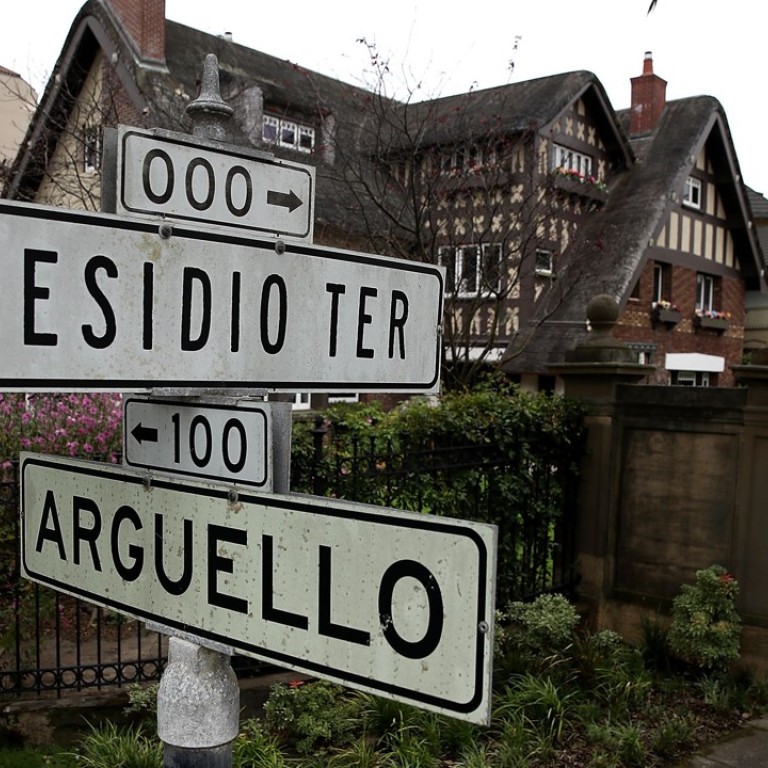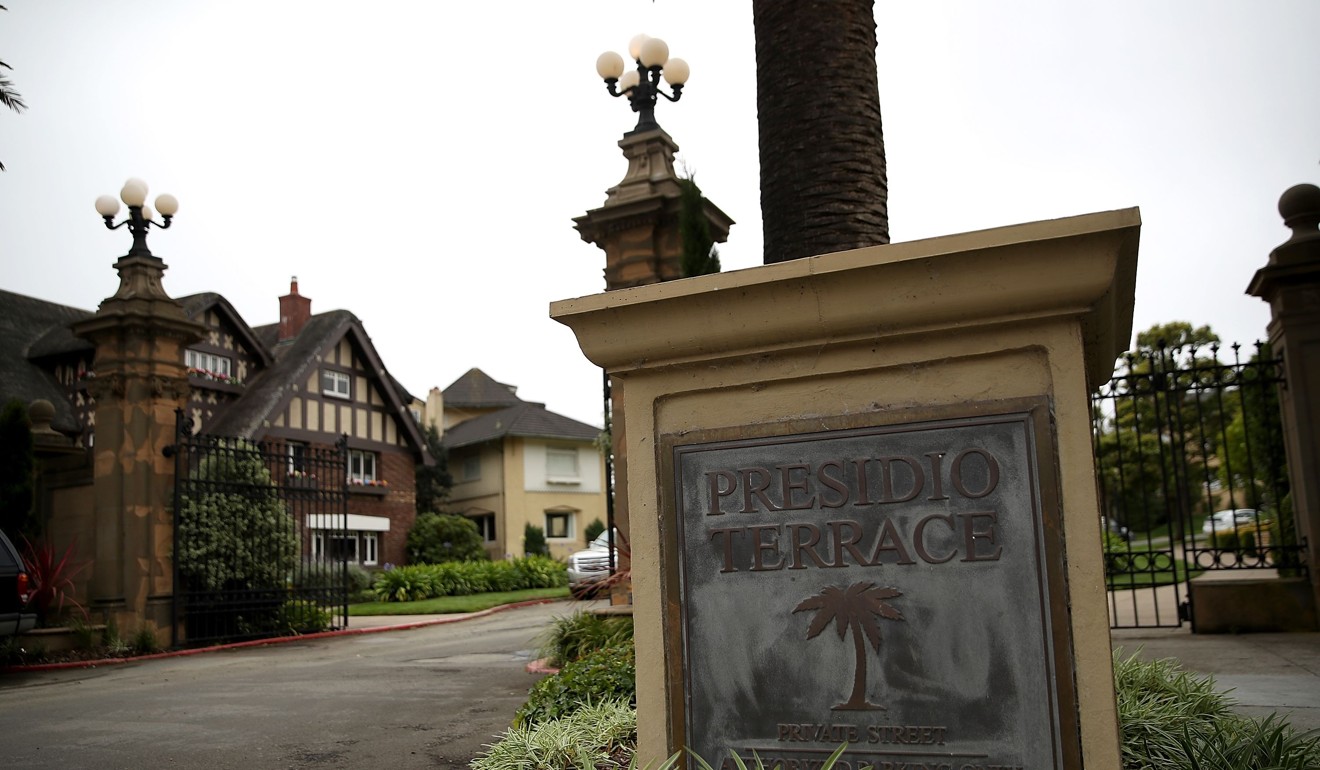
San Francisco returns street to homeowners, reversing tax default sale to couple slammed as ‘speculators’
Tina Lam and Michael Cheng, who bought Presidio Terrace for US$90,000 after its wealthy homeowners defaulted on tiny tax for years, say they will sue the city for engaging in unprecedented favouritism
A block of homeowners that failed to pay a US$14 tax for decades will nevertheless get to keep the private garden islands and gated street that adjoins their mansions, San Francisco officials decided Tuesday, as they reversed a tax default sale for the first time in the city’s history.
Tina Lam and Michael Cheng, the San Jose couple who had bought Presidio Terrace for US$90,000 at an auction and hoped to rent or sell it back to the residents blasted the decision as favouritism.
A US senator personally advocated for the neighbours – one of whom is the British consul general. And they “lined up Tuesday to plead their case, saying they were regular, hard-working San Franciscans.”
The enormous homes of Presidio Terrace can sell for eight figures, as Alex Horton wrote for The Washington Post. Representative Nancy Pelosi and Senator Dianne Feinstein both used to call the street home.

Sales like this happen every day to all kinds of people and businesses
And yet San Francisco’s ultra elite have had no end of trouble paying a tiny tax on the palm trees, pavement and shrubbery within their gated cul-de-sac.
The neighbourhood association first defaulted on the street in the 1970s, according to the San Francisco Chronicle. It got the title back in 1985 – and then immediately fell into arrears again.
The residents had forgotten to give the city their new accountant’s address, the Chronicle reported, and so never saw their US$14 annual tax bill.
The city, meanwhile, kept sending the bill to the bounced address, year after year and into the 21st century – until Presidio Terrace racked up US$994 in outstanding taxes and fees.
Accordingly, it ended up on an auction list in early 2015.

For the next two years, no one on Presidio Terrace even noticed their street had been sold.
This situation changed abruptly in May, Horton wrote, when a representative for the new landowners asked the residents if they wanted to buy their street back.
“I was shocked to learn this could happen and am deeply troubled that anyone would choose to take advantage of the situation and buy our street and sidewalks,” an anonymous homeowner told the Chronicle in August, after the neighbourhood association sued the couple and appealed to the city to reverse the sale.
The residents complained that the city never notified them they were in danger of tax default, other than sending mail to the wrong address. Their lawyer accused Lam and Cheng of essentially extorting them – and trying “to exploit a bureaucratic oversight to their advantage.”
The city’s tax collector pointed out that Presidio’s residents were treated the same as any other tax delinquents. His office had posted notice of their default on its website and in newspapers, and sent certified mail to the address the residents had supplied.
But as the battle to come would demonstrate, the residents of Presidio Terrace were not your average tax delinquents.
“The well-heeled homeowners of San Francisco’s Presidio Terrace neighbourhood are assembling quite the army to help them win back the private street they lost to a South Bay couple,” the Chronicle wrote in September, after residents hired several former city officials to lobby the city.
Senator Feinstein wrote a letter to the city in October on her former neighbours’ behalf. She felt “personal empathy” for the residents, she wrote, but insisted her objection to the sale had nothing to do with that history.
“In the United States, no one should lose property at the hands of the government without knowing it,” Feinstein wrote.
And so on Tuesday, the elected Board of Supervisors that governs San Francisco did something it had never done before and held a vote to reverse a tax sale from two years before.
Not everyone on the board was sympathetic to the residents. “Sales like this happen every day to all kinds of people and businesses,” supervisor Aaron Peskin told the Chronicle.
The city’s tax assessor wasn’t swayed either. He told the supervisors that more than 10,000 bills are sent to wrong addresses every year, and yet most of those people manage to pay their back taxes before they lose their property.
Presidio, meanwhile, had failed for 30 years.
“This stinks of entitlement, unless of course you hold hearings for every homeowner or group who has their property auctioned off for non-payment of taxes,” one resident wrote to the board, according to CNN.
But a majority of the board sided with the residents and against the couple.
Lam and Cheng presented themselves as a working couple who merely wanted to invest in San Francisco.
After voting to take the street from them, Mark Farrell called the couple “speculators … attempting to extort San Francisco residents that I represent into a quick US$1 million payday,” according to the Chronicle.
So the residents of Presidio Terrace will get yet another chance to pay their taxes and keep their street.
And “the speculators get their money back,” Farrell told the Chronicle. “No harm, no foul.”
It is unclear how Cheng and his wife will get their money back.
“The law should be fair for everyone,” Cheng told reporters after the vote.
According to the Chronicle, he and his wife plan to sue to get it back.

